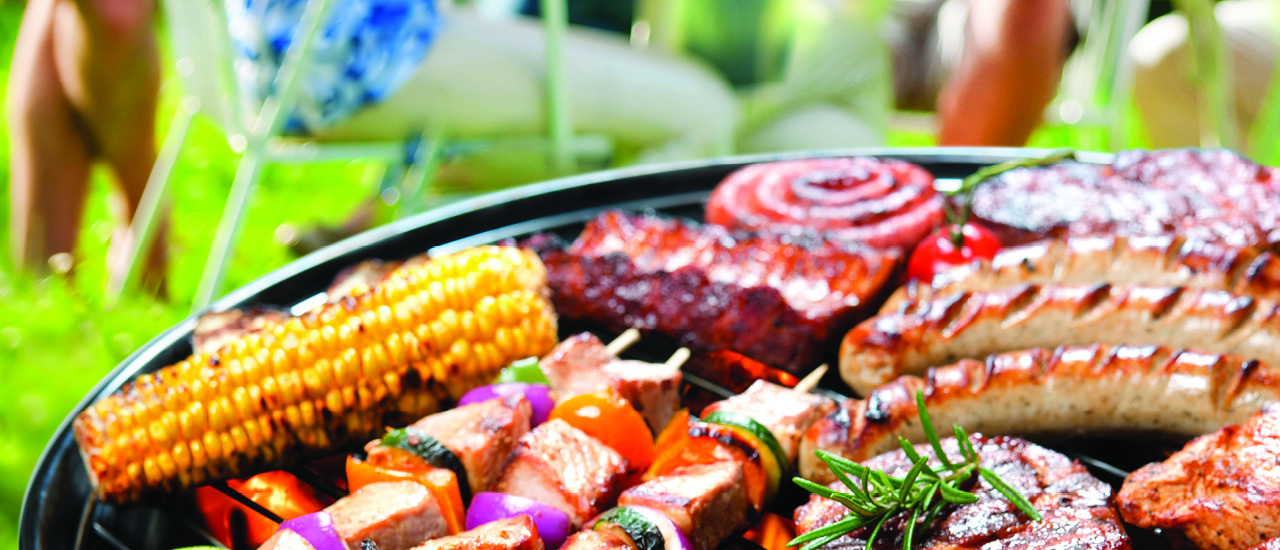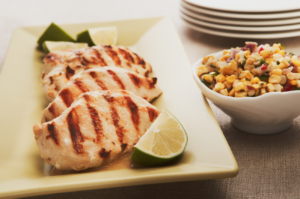
By Victoria Beechum
Balanced nutrition is an important part of a healthy lifestyle and making nutritious food choices can affect your health today, tomorrow and for the rest of your life. Along with physical activity, eating well can help you reduce your risk of chronic diseases and promote overall wellbeing in mind, body and spirit.
Whatever food choices you are making for yourself, food safety is just as important as nutrition
Food safety is especially important during summer months, when the weather is warm and more of us are outdoors enjoying picnics and BBQs.
Food poisoning, also known as food-borne illness, is a danger that arises from mishandling raw or under-cooked meats or seafood, and unwashed fruits and vegetables. Your best defence against food poison-ing is to follow proper food safety guide-lines while shopping, storing, preparing and eating meals.
Older adults are more vulnerable to food poisoning because our immune systems weaken as we age, and because chronic diseases make it harder to fight off infection caused by food-borne bacteria and viruses. Pregnant women, whose immune systems are suppressed, and toddlers, whose immune systems are still developing, are also at greater risk.
Warm summer temperatures and all-day picnics can present particular food safety challenges, cautions dietitian and food safety specialist Amy Campbell, because bacteria grow faster within the temperature range of 4 to 60°C, “commonly known as the Danger Zone.”
It’s a myth that you can test food safety by sight, smell or taste. Dangerous bacteria can grow to unsafe levels well before a person can detect it with their senses.
When in doubt, throw it out!
Follow these guidelines to keep you happy and healthy all summer long
SHOPPING
In hot weather, choose your non-perishable items first, then your perish-able items. Meat should be the last thing into your cart or basket. Keep your meat separate from foods that won’t be cooked, such as fruits and vegetables. Double-bag your meat. If you have a long drive or a few errands to run, buy a bag of ice and be prepared with a cooler in your trunk to keep your groceries safe and out of the Danger Zone.
Wash your re-useable bags between uses to prevent bacteria from growing and contaminating your food.
STORING FOODS
When you get home, put your meat in the fridge immediately. “Don’t store raw meat above fresh foods, like fruits and vegetables, in case the juices drip,” says Campbell. If your crisper is at the bot-tom of your fridge, place raw meats into a dish or on a tray to catch any juices that might leak. “Keep the door of your fridge or cooler closed as much as possible,“ Campbell advises, “and don’t over-pack your fridge or cooler. Cool air does need to circulate to keep things cold.” Replenish cooler ice packs frequently to keep food out of the Danger Zone when camping or adventuring.
Shelf-stable foods in your pantry don’t need special treatment in the summer months. However, you might want to consider moving some fruits you normally store at room temperature, such as bananas, into the fridge to deter pests. Fruits will sometimes ripen faster in warmer temperatures, so moving them into the fridge might extend their shelf life and lead to less waste or less frequent trips to the market to re-stock.
In all seasons, if you see any dented or bloated cans in your pantry, throw them out. This is a sign they may be contaminated with botulism.
PREPARING & CONSUMING FOODS
Cook meat to an internal temperature of 71 °C or higher (>74 °C for poultry) using a digital food thermometer inserted into the thickest part of the meat. You can’t go by colour, taste or smell – that’s another myth. Just because meat is brown and smells alright doesn’t mean the bacteria have been killed.
Serve food as soon as possible after cooking, or keep foods warm using the BBQ or oven. Don’t forget about salads with perishable ingredients, such as potato salad, which needs to be kept in a cooler or on ice. Food should not be left out for more than one hour on warm summer days. Refrigerate leftovers within two hours of cooking, or one hour on hot days. Put food into shallow containers to cool quicker.
For more info on summer food safety, visit www.canada.ca/en/health-canada/services/general-food-safety-tips/food-safety-tips-barbecuing.html
Food Safety Rules
- Know the Danger Zone: 4-60 °C.
- Food shouldn’t be left out for more than 1 hour in summer months.
- Keep it clean: Wash utensils, containers, bags, and hands often and al-ways after touching raw meat. Keep cutting boards for raw and fresh food separate. Wash hands with soap and warm water for 15 seconds to remove bacteria.
- Meat should be tested for doneness using an internal thermometer inserted at the thickest part of the meat (>71°C for meat, and >74°C for poultry).
- Leftovers should be reheated to an internal temperature of 74°C.
- Keep cold foods cold: On a picnic, store your potato salad and other cold salads in an insulated cooler.
- Cooked meats will keep as leftovers for 2 to 4 days.
- Cooked fish will keep as leftovers for 1 day.
Surprising but Common Sources of Food Poisoning
- Fish and seafood should be consumed within one day after cooking.
- Sprouts grow in a moist environment perfect for breeding bacteria, and have a very short shelf life.
- Baby carrots come in very moist packages and have been shown to carry higher levels of salmonella.
- Spinach, lettuce, and other fresh veggies can become cross-contaminated from the soil where they grow, so wash them thoroughly.
- Ground beef should always be cooked thoroughly – always, always, always.
 Recipe:
Recipe:
Margarita Chicken
INGREDIENTS
4 boneless skinless chicken breasts
MARINADE
1 tbsp lime zest
1/2 cup fresh lime juice 1/4 cup canola oil
3 tbsps tequila (optional) 1 tsp kosher salt
1/8 tsp cayenne pepper
PREPARATION
Put chicken in a re-sealable plastic bag. Whisk together marinade ingredients and pour over chicken. Seal bag and turn it gently so marinade coats each piece of chicken. Refrigerate for 1 hour.
Pour marinade into a small saucepan, leaving chicken in the bag. Bring marinade to a boil and continue boiling for 1 minute. Remove from heat.
Heat grill to medium. Grill chicken with the lid down, turning once and basting frequently with boiled marinade, until a thermometer inserted into the chicken reads 74°C (about 5-7 minutes per side). Remove from heat and let stand 5 minutes before serving. Serve with salsa.
Recent News

Winnipeg Jets Parkinson’s Disease Awareness Game!

Volunteer Profile: Carole Grier

